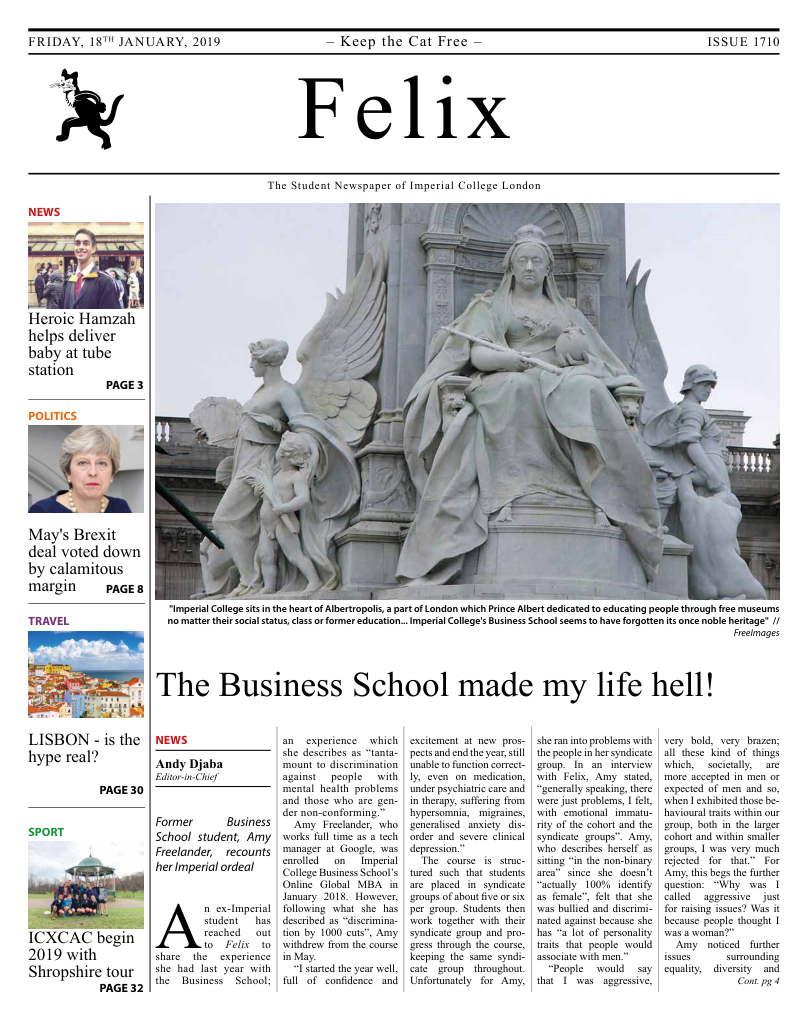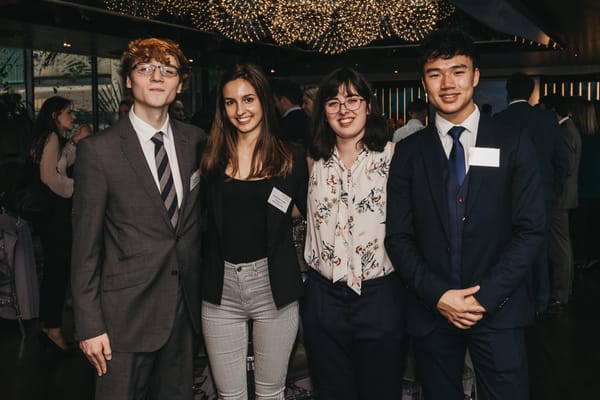The Business School made my life hell!
Former Business School student, Amy Freelander, recounts her Imperial ordeal

An ex-Imperial student has reached out to Felix to share the experience she had last year with the Business School; an experience which she describes as “tantamount to discrimination against people with mental health problems and those who are gender non-conforming.”
Amy Freelander, who works full time as a tech manager at Google, was enrolled on Imperial College Business School’s Online Global MBA in January 2018. However, following what she has described as “discrimination by 1000 cuts”, Amy withdrew from the course in May.
“I started the year well, full of confidence and excitement at new prospects and end the year, still unable to function correctly, even on medication, under psychiatric care and in therapy, suffering from hypersomnia, migraines, generalised anxiety disorder and severe clinical depression.”
The course is structured such that students are placed in syndicate groups of about five or six per group. Students then work together with their syndicate group and progress through the course, keeping the same syndicate group throughout. Unfortunately for Amy, she ran into problems with the people in her syndicate group. In an interview with Felix , Amy stated, “generally speaking, there were just problems, I felt, with emotional immaturity of the cohort and the syndicate groups”. Amy, who describes herself as sitting “in the non-binary area” since she doesn’t “actually 100% identify as female”, felt that she was bullied and discriminated against because she has “a lot of personality traits that people would associate with men.”
“People would say that I was aggressive, very bold, very brazen; all these kind of things which, societally, are more accepted in men or expected of men and so, when I exhibited those behavioural traits within our group, both in the larger cohort and within smaller groups, I was very much rejected for that.” For Amy, this begs the further question: “Why was I called aggressive just for raising issues? Was it because people thought I was a woman?”
Amy noticed further issues surrounding equality, diversity and inclusion when lecturers took it upon themselves to address the cohort about gender issues and has told Felix of “lecturers talking in lectures about LGBT+ issues with no understanding of the topics that they were talking about (confusing transvestism, transgender people, and drag queens and calling them scary and saying that all men have to do is dress up as women to understand them)”. Amy also complained about “deans not understanding what constitutes offensive notions to LGBT+ people (e.g. telling people that they turned other people gay) and arguing with me, as an LGBT+ person, that I shouldn't be offended by what I am offended by”. Despite having good intentions, the lecturers made “a complete mess of it”, leading Amy to question whether they received “institutional support or training to talk about” the topic.
“My main concern is, there are a lot of people on that course who never would have probably ever encountered LGBT people and, because it’s a global course as well, there’s going to be a lot of people that are coming from cultures where it’s even illegal to be LGBT. Having somebody stand up and talk from a point of authority as a lecturer about these things from an ill-informed manner was a real problem for me.”
Amy shared that a lecturer “also said some other things which, as a feminist”, she “struggled with as well”:
“He said things around, ‘Well of course I don’t want to offend women, I’ve got 2 daughters’. That classic line of ‘because they’re our mothers, sisters and daughters, of course we love them’…that’s just nonsense but it just further propagates biases that people have.”
To Amy, the issues “started moving into the territory of a form of institutional sexism… institutional discrimination” and Amy claims that, even back in the induction week, “there was evidence of it”. “They had guest lecturers come in who would call the women ‘darling’ who would say ‘oh no I’ve got to take this question from this lovely lady in front, I can’t leave a damsel in distress’”. Amy found herself asking the futher question, “what does diversity mean to education courses - how can you integrate all the voices and ensure things are kept respectful?” Amy believes that part of the problem was the university failed to “set up a good enough, strong enough Imperial culture” and wonders what the Business School’s Admissions policy looks at to “ensure diversity and that the students entering have the right attitudes to teamwork and diversity”. Amy also suggests that managing diversity should be a core syllabus item on the MBA course.
“People would naturally come in and exhibit the culture that they were used to, which was a problem and it ended up that we all clashed and the university itself wasn’t very good at supporting us at all”.
Problems surrounding equality, diversity and inclusion were not the only sources of distress for Amy. “There were a lot of content issues; things hadn’t been checked, the quality wasn’t very good”, tells Amy of already spotting “red flags” within the one-week induction and the pre-induction periods. Besides the fact that much of the content was from Harvard Business School and there were “lots of mistakes and outdated content”, Amy also noticed “endless material focused on white, cisgendered males”.
“A lot of the content was very much targeted to a male perspective. They gave analogies related to football and F1 and things that you could understand how, in the ‘70s that’s what you would accept from a Business school but, in this day and age, it wasn’t good enough. They received a lot of complaints.”
Imperial Business School carry their “elite status” with pride and market themselves as one of the world’s leading universities. In Amy’s opinion, Imperial Business School still has a lot to work on before being worthy of its “elite status” in the world.
“There are of course some faculty members who you see are trying, or have found themselves in an environment that isn’t representative of how they’d do things but the vast majority of staff, and materials are not where they should be for an elite school.”
According to Amy, she and many of the students in the cohort were just learning off YouTube, which begs the question, “how can the Business School justify the cost of its Global MBA programme?”
Amy said: “They wanted you to pay your money, take what you’re given. For a lot of students, it was because they just wanted the Imperial name, they just wanted the certificate and this is part of the problem. This was also part of the tension within the cohort. The vast majority of people were doing it because of Imperial’s reputation. They didn’t really care so much about the quality of what we were being taught.” Other students in the cohort have tried to defend this in ways which Amy considers “selfish, misguided and unethical, including arguing that, “paying a lot for a course means that you should work hard, even if this means teaching yourself or struggling through materials because of poor administration or teaching.”
For Amy, the whole reason that she chose Imperial was because she thought it “implied quality”: “I thought that I’d be getting a high quality of teaching, a high quality of integrity, when in reality, it’s all just brand, it’s all just representation. That’s all I feel the majority of the staff at the Business School really care about. They don’t care about the quality for quality’s sake, they care about what people think about them, which is not the same”

Amy found herself asking whether Imperial College is elite or elitist and whether the two can be separated. “In an ideal world, you’d want integrity and reputation to go hand-in-hand but we all know that reputation and integrity, there’s not a direct parallel all the time. There should be but there isn’t, especially with organisations and institutions that have been going for many, many years if not over centuries. It takes a long time for reputations and brands to change, it’s not an overnight thing.”
Amy complains of problems that she felt “gave people who had come into the course with a certain level of privilege even more privilege over other people.”
Amy added: “I come from the direct opposite to the privileged, elitist bubble that this course seemed to want to protect. And it's not something I can stand for.”
Following the problems with bullying and issues with her syndicate group, Amy decided to contact those in charge of the course. However, she ran into countless difficulties. She grew frustrated with the continued inaction on the part of the Business School. Within the first two months Amy sent 12 e-mails, to which she received no response. Amy recounted: “I was telling them I was in a lot of emotional distress, please don’t ignore this email. It wasn’t just casual stuff, it was ‘I’m hitting crisis point, please help!’”
It got to the point where Amy then had to escalate it to the Dean of the Business School because she was still receiving no response. When they did finally respond, I had a Skype call with the Course director.
“I think generally speaking, all the way through I was having a lot of problems with them and they just didn’t help me. They knew that I was suffering and, in many ways, they just made it a lot worse. They were fully aware that was being bullied and did nothing to stop it.”
Two weeks into the second term, the stress built again because “the quality of the teaching materials was just so poor again”. The course took its toll on Amy and left her really ill:
“By that point I was really suicidal and just really depressed and my partner and I decided that a major source of distress was this course. There was nothing more that I could do, it wasn’t going to get any better. I wasn’t in a position to accept the poor quality, I felt that I hadn’t been treated fairly, I felt that my reputation within the cohort had been damaged and also, it got to a point where I felt my integrity was being compromised. I didn’t want to be associated with the course and I didn’t want to propagate this elitist mentality of 'it doesn’t matter about the quality of the course, of the teaching etc., it’s all about the name and the brand and the reputation and what people think of it outside'”.
Amy is still dealing with the ramifications of the ordeal she suffered through. When speaking to Felix , she mentioned “I’ve only today just got a psychiatrist say that I’m actually now better. It’s taken all this time for the depression to go away and that’s with medication, therapy, everything and I had to take three months off work because of it aswell so it’s not inconsequential to me”.
When approached for comment, Professor Francisco Veloso, Dean of Imperial College Business School, said: “We are committed to providing all students with a world-class educational experience, and want everyone in our diverse and global community to feel supported and respected.
It would not be appropriate for us to comment on specific matters relating to an individual’s complaint. However we deeply regret if any student has had a negative experience or did not receive the support they expected, and we always seek to learn and improve.
We welcome feedback from students, and are always looking at ways we can enhance our programmes, currently with a particular focus on student experience. Our students are instrumental to our aim of innovating, and their insights have driven many of the changes being introduced to our programmes. Any students who would like to share further suggestions or concerns are always welcome to contact me.
We are very proud of our student body, and look forward to continuing to work with them to maintain and develop our community.”

After self-researching and having to fight alone, Amy followed the official complaint procedures afforded to her, which took six months. Whilst her complaints were all substantiated, she was left “profoundly disappointed by the contrition, empathy and humanity shown by the Business School”.
Amy recently published an article on LinkedIn, titled, "2018, My Year of Hell, Thanks to Imperial College Business School's Online Global MBA". In this article, Amy gives a full account, detailing her version of events. She added: “I do want to be categorically clear that this is not just my story. A lot of the things I was affected by, affected other students too. I know other students who have suffered on this course too and didn't get the support they needed. Some even withdrew too- just more quietly than me!”








